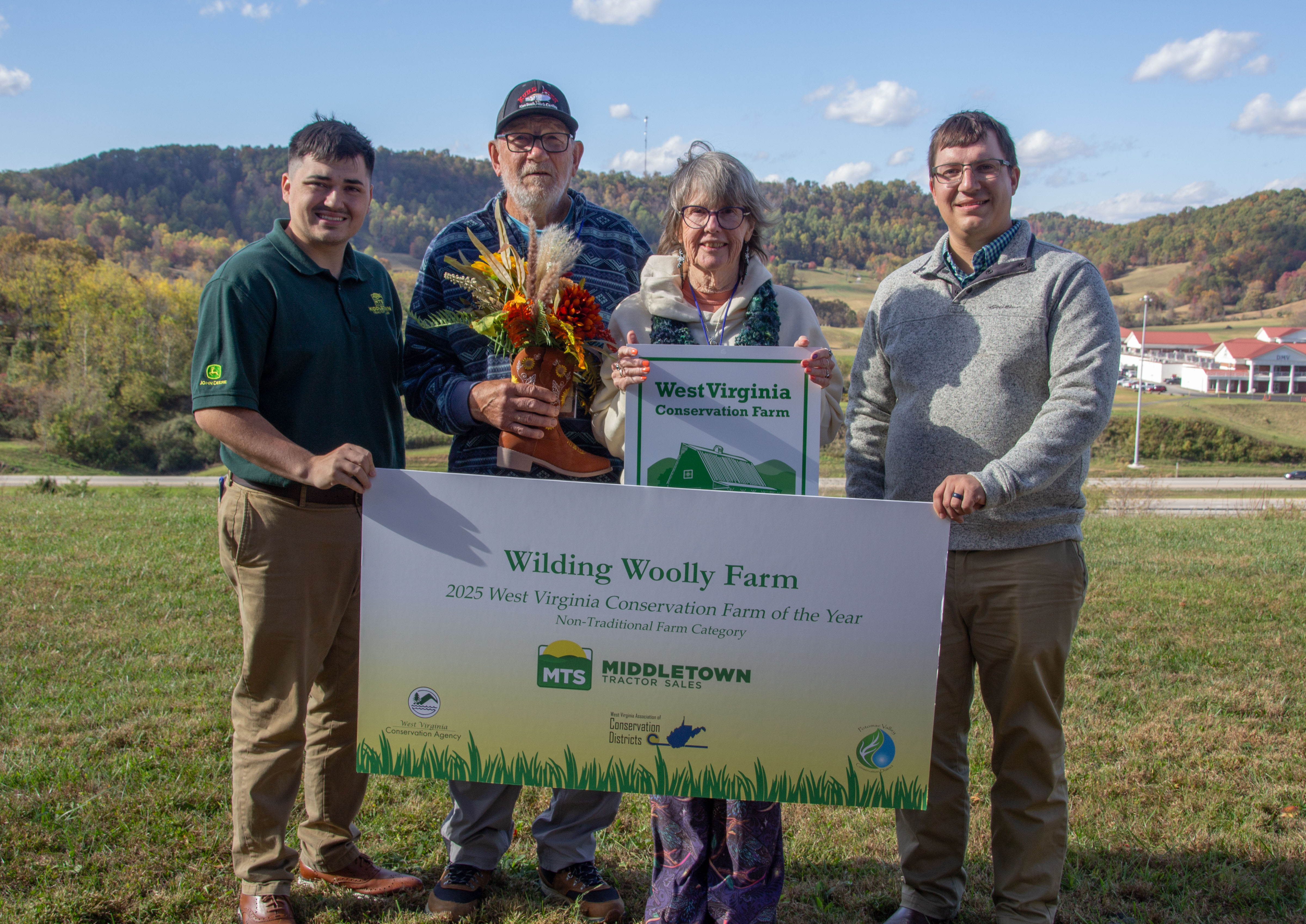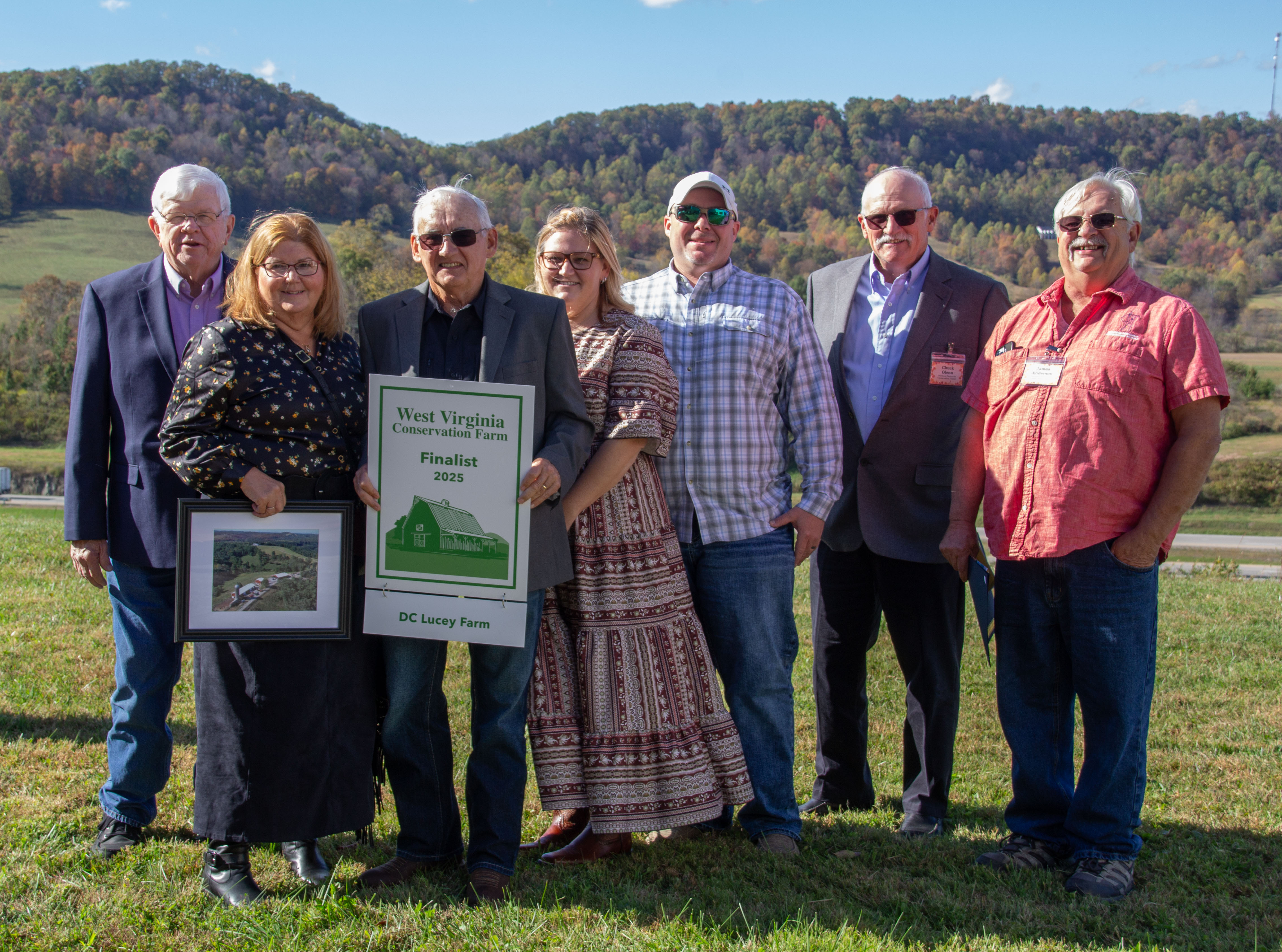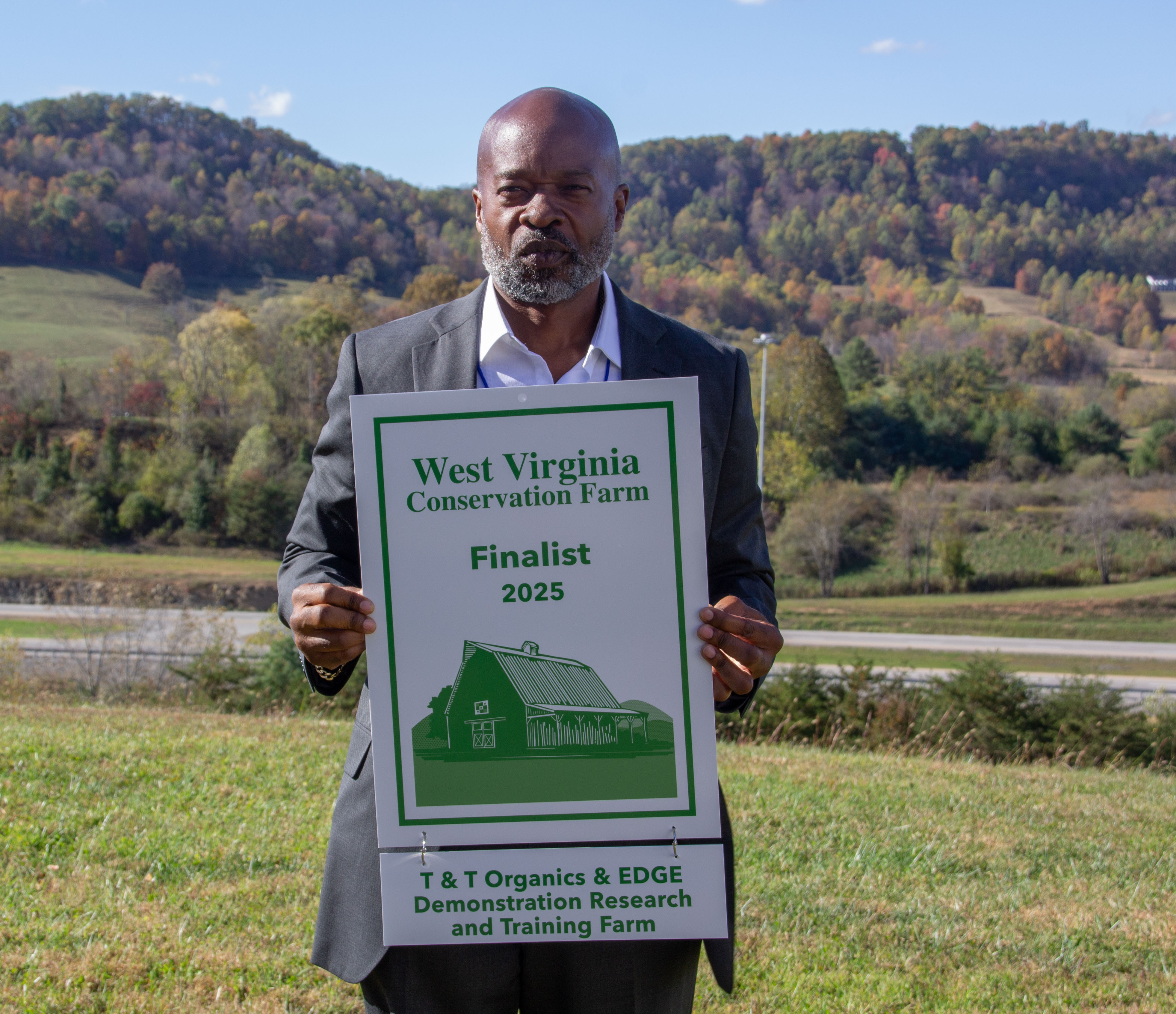
SUTTON, W.Va. – Farmers from the Ravenswood area and near Mathias in Hardy County, who were recognized for their efforts to protect soil, water and other resources, received the top West Virginia Conservation Farm of the Year awards during a recognition ceremony Oct. 23 in Sutton.
The Parrish J. Pendley Farm in Jackson and Wood counties (Traditional Farm) and Wilding Woolly Farm in Hardy County (Non-Traditional Farm) received the awards during the West Virginia Conservation Partnership Conference luncheon Oct. 23.
Parrish Pendley, also known as “PJ,” operates his farms in Jackson and Wood counties with his wife, Jessica, and daughters Paisley, Josie and Tilly.
Hope and Beverly Yankey’s farm near Mathias in Hardy County is a sheep farm where wildlife, soil and water conservation practices are also strongly emphasized.
Each farm received a $1,000 award and will receive the use of a tractor from Middletown Tractor Sales in Fairmont, a longtime sponsor of the conservation farm awards.
Both farms have demonstrated a commitment to conservation practices that protect soil, land, water and related resources. Wilding Woolly Farm was sponsored by the Potomac Valley Conservation District and the Pendley farm was sponsored by the Western Conservation District.
West Virginia farms are eligible for the Conservation Farm of the Year honor after winning first at the county, district and area levels. Two groups of judges visited both farms in August, as well as the other finalists’ farms, and graded them on their use of best management practices, impact on ecological systems and community-based activities.
The Pendley farm was in the running against finalist the DC Lucey Farm in Marshall County, and Wilding Woolly competed against finalist T&T Organics & EDGE Demonstration Research and Training Farm, in McDowell County.
The farms in the Traditional category are more large-scale operations that include livestock like cattle, poultry, sheep and goats, as well as fruit and vegetable farming. The Non-Traditional category includes farms with smaller-scale horticulture practices, but ones that still may incorporate some smaller livestock.
Parrish J. Pendley Farm
The Pendley family’s enterprise is both a cow/calf operation and also an extensive row crop and hay operation, specializing in corn and soybeans, across three farms in both Jackson and Wood counties.
Parrish Pendley practices rotational grazing, which reduces livestock’s impact on farmland and helps control erosion, across all farm areas with cattle. He’s also developed new water sources on his farmland to help deal with the impacts of drought.
Some of the woodland on his farms is separated from pastureland by exclusion fencing, which aims to keep livestock out of critical areas not intended for grazing.
The operation also includes a 50-foot by 50-foot barn and manure storage facility that’s part of a comprehensive nutrient management plan.
Pendley has a Conservation Reserve Program (CRP) buffer on 10 acres of his farm in Belleville, in Wood County. The buffer helps keep water from settling in the fields where he grows corn and soybeans.
Adjoining the buffer is a 40-acre wildlife sanctuary and wetland designed by the state Division of Natural Resources. Fish and other wildlife live in the wetland.
Pendley’s farmland is the first that feeds into the wildlife sanctuary and wetland, so the 10-acre buffer serves as filter strips.
A key component of CRP, grass filter strips protect water quality by acting as a natural filter to sediment, nutrients and other pollutants, and protect soil from erosion by stabilizing cropland that might have been susceptible to damaging water and wind, according to the USDA-Farm Service Agency (FSA).
The Pendleys are first-generation full-time farmers.
“You take a special pride in being able to manage these farms and have them way better than when you obtained them -- and strive to make them better hopefully for the next generation -- because you know how hard they were to acquire yourself,” Parrish Pendley said.
Pendley has participated in various panel discussions as a member of the West Virginia Farm Bureau.
He was a past Farm Service Agency committee member for three terms. He also supports 4-H and the Jackson County Junior Fair, and his daughters are involved in 4-H Cloverbuds.
The Pendleys and their daughters are also active in their church, Milhoan Ridge Baptist Church, and in their community.
Wilding Woolly Farm
The Yankeys’ conservation philosophy has evolved into introducing conservation practices on the farm, but then minimal interference after establishing the practices and “allowing Mother Nature to continue the restoration and return to balance,” Hope Yankey wrote in a farm biography.
In 2022, the second-largest tree planting in West Virginia that year took place at Wilding Woolly in an area of the farm set aside in the Farm Service Agency’s Conservation Reserve Enhancement Program (CREP).
The trees were planted in areas with poorer soil, on hillsides or in wet, spring-laden areas that may flood. Such land is ideal for excluding livestock.
“They planted 1,100 trees in two days,” she said. “It was phenomenal.”
A trip to New Zealand in 1993 opened Hope’s eyes to a new way of doing things on the farm. The goal became to under-stock and under-graze the farm, with far fewer sheep and fewer Scottish Highland cattle. Hope and her husband also began to remove livestock from woodlands and riparian areas and moved toward using only organic and “low-impact methods in an effort to transform the soil health and habitat for plants and wildlife,” Hope wrote.
Last year, the Yankeys took on streambed restoration within the Bald Knob tributary that is the beginning headwaters of the Lost River. A bulldozer helped establish two triple-tiered pooled areas to collect and dam water, and 10 log dams were erected along the stream bed.
Nine trees and 55 native streambed shrubs and bushes were then planted to help shade the water to cool surface temperature for aquatic organisms.
The Yankeys’ other best management practices on the farm include watering facilities, exclusion, division and woodland exclusion fence, 16 Eastern bluebird boxes, wildlife friendly fencing and pollinator habitat establishment. Milkweed and thistle have been allowed to grow to welcome pollinators.
The couple’s efforts have led to the reintroduction of species to the farm, including a variety of birds, butterflies, bees, small mammals and aquatic life, Hope said.
“At the moment, Bev and I, in our mid-70s, are committing this farm to strictly a conservation effort in part to make sure that we can protect the Lost River watershed and the pristine environment that we’ve been able to produce here over the course of 45 years,” Hope said.
They plan to enroll their entire property, as well as an adjoining 40-acre property they are in the process of purchasing, into a conservation easement with the Cacapon & Lost Rivers Land Trust, which will preserve the land in perpetuity.
Hope and Bev’s community service work includes hosting a “Lost River Clean Up” roadside trash pickup, media outreach to share their story and highlight available conservation programs, and volunteer work at Lost River State Park and Shenandoah National Park.
Hope received a Women in Agriculture in West Virginia award in 2021 and obtained a Master Naturalist certification in 2018.
The mission of the West Virginia Conservation Agency is to provide for and promote the protection and conservation of West Virginia’s soil, land, water and related resources for the health, safety and general welfare of the state’s citizens.
 
Attachments: None
|



